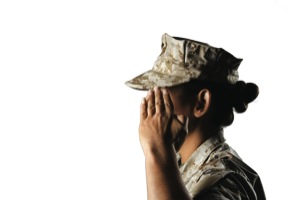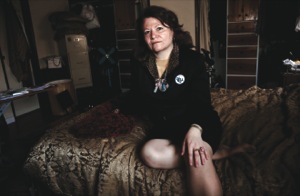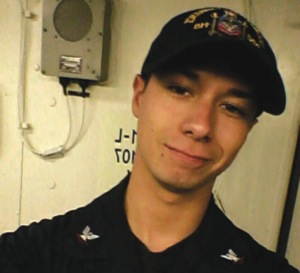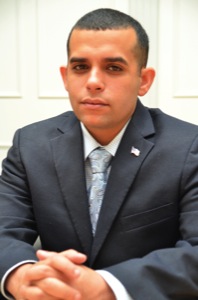
For more than a decade, the U.S. Dept. of Defense’s “Don’t Ask, Don’t Tell” (DADT) policy claimed the careers, livelihoods and in some cases, the lives of American servicemembers whose only crime was volunteering to serve our nation and being gay, bi or lesbian at the same time.
The contention among repeal advocates was that there would be little if any negative impact if LGBT servicemembers were allowed to serve openly.
The impression that there has been a general lack of “drama” regarding LGBs serving openly is backed up by post-repeal statements from top brass, such as Marine Corps commandant, James F. Amos. Gen. Amos, who had vigorously opposed repeal, recently told a reporter, “It hasn’t been a problem.”
Visit LGBTweekly.com to read a comprehensive study compiled by military experts at UCLA’s Palm Center about the effect of the repeal on the various branches of military.
We mark this first anniversary of the repeal by talking to some local servicemembers and veterans.
Lisa Kove, executive director, DOD FED GLOBE

How did Don’t Ask, Don’t Tell affect you before it was repealed?
I am stating my opine based on being the executive director of DOD FED GLOBE and this is not intended to reflect the views of my employer, the Dept. of Defense (DoD).
DADT taught people that it is acceptable and even encouraged to fear and hate all LGBT people.
I came out in the DoD in the northeast in 1997 on a joint design team, and was the R&D lead. My work and person were both respected by the team and others.
However, when I transferred to San Diego, Calif. in 1998, I was not allowed to check in and was kicked off base, just because I am openly gay.
Almost half a year later I was allowed to check in. Two years later, the two top people in the organization were given the choice between criminal prosecution or resignation for what was done to me. They chose resignation. Normally the LGBT person is fired – or worse.

How has a year of freedom to serve openly in the U.S. military changed your life?
This is a monumental change, but progress is moving at glacial pace. We have been pushing for diversity inclusion within the DoD and its aligned corporations. We succeeded in pushing the very first declaration by the Secretary of Defense that June is LGBT Pride month in the Department of Defense. A Pentagon Pride event was held this year for the first time in history, making it clear to those who would like to see the repeal of DADT repealed, that that idea is dead on arrival. One of the biggest loopholes that still remains is that transgender service members can still be fired just for being transgender.
Our military families need to get the same housing privileges as opposite-gender married couples are given. They are not receiving this benefit.Cpl. Gustavo Aldino-Alvarado, United States Army
How did Don’t Ask, Don’t Tell affect you before it was repealed?
Despite that I was not completely comfortable with whom I was at that point in life, I felt like I not only had to be judged by society and my family, but I too was going to be criticized, ridiculed and perhaps even put out by the organization I’d vowed to serve with pride and honor. To defend freedom. This freedom couldn’t just be earned and valued by one group.We took the oath and bleed and make sacrifices just like our heterosexual brothers and sisters in arms do; so why wasn’t the sacrifice of those of my sexual orientation not allowed to be honored and respected? It was a struggle for equality and maybe more just freedom and reapect for those LGBTs before us, the ones that were actively serving, and those that would come after us.
How has a year of freedom to serve openly in the U.S. military changed your life?

It has definitely lifted pressure off of many of the SM’s currently serving. There is no fear that because rumors start that one might be gay, or that maybe friends, colleagues might see you at a gay bar or with one’s significant other; one would be chaptered out.
CTT3 Patrick Hernandez, E-4, United States Navy
How did Don’t Ask, Don’t Tell affect you before it was repealed?
Before the repeal, I hid relationships and lied to coworkers because I was afraid of being kicked out or having them think badly of me. There were still friends that knew, but hiding it from people you see everyday was stressful and hard to handle.
(Thanks for (publishing this) by the way; it’s a refresher as to how binding things used to be and how much of a relief we feel now that it’s gone.)
How has a year of freedom to serve openly in the U.S. military changed your life?

This past year has been an eye opener as to the things I can do now that I would have never thought were possible before; such as marching in the Pride parade or introducing my boyfriend to coworkers as “my boyfriend” instead of the usual lie of my roommate or cousin.
Cpl. William Rodriguez-Kennedy, United States Marine Corps, retired
How did Don’t Ask, Don’t Tell affect you before it was repealed?
DADT affected me in that it prevented me from fulfilling my calling of service. It was a tough blow. For me, a young 20 year old to have the one thing he always wanted to be, a U.S. Marine, taken away from me. I struggled with that for a long time before becoming an activist and fighting.
How has a year of freedom to serve openly in the U.S. military changed your life?
Open service hasn’t affected me as I an not currently serving but the repeal was vindicating and it opened up the possibility that I may one day soon be able to return to service.












I’m glad this shit has come to an end. Damn, I can’t imagine how it would have gone if I wrote to my girlfriend while at war…